About the Church
 |
 |
 |
 |
 |
 |
 |
The Role of Laymen in the Church – III
Theological Doctrine & Canon Law:
Laymen Can Question Their Superiors
I wish those priests who say a layman should not defend Holy Mother Church or dare to address priests would look to one of their own who was ferociously fighting the Liberalism in both the clergy and society at the turn of the 20th century. I am speaking of Msgr. Henri Delassus (1836-1921), who authored the work
L'Americanisme et la Conjuration Antichretienne ( Americanism and the Anti-Christian Conjuration, 1899), read in English here.
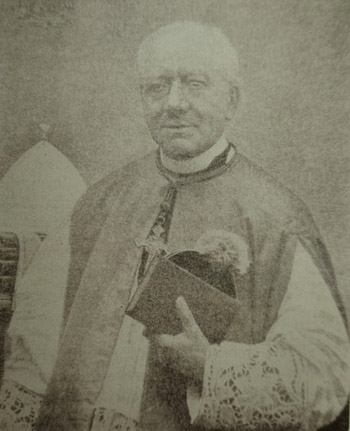 In that work, this valiant polemicist called on all Catholics – clergy and laymen alike – to fight for the Church and strive for "the humiliation of the enemies of God" – even if they are seated inside the Church – and "the coming of the Reign of the Divine Savior." His pen aflame, he writes: "It is up to us [laymen and priests] to strive for this humiliation and this Reign. To do this, it is not enough to pray, we must also fight."
In that work, this valiant polemicist called on all Catholics – clergy and laymen alike – to fight for the Church and strive for "the humiliation of the enemies of God" – even if they are seated inside the Church – and "the coming of the Reign of the Divine Savior." His pen aflame, he writes: "It is up to us [laymen and priests] to strive for this humiliation and this Reign. To do this, it is not enough to pray, we must also fight."
And he lambasts those clergy who "want to stifle the polemic that until now has preserved the Faith of all corruption in order to replace it with a pacifism that would only maintain peace – and what a peace! A peace won at the expense of the inalienable rights of truth!" (Chap. 15, 'Que Faire?' - 'What to Do?')
This sound counsel of Msgr. Delassus, who was highly praised and honored by Pope St. Pius X, sounds quite different from the "infallible dogma" coming from many of today's traditionalist priests: that laymen cannot raise their voices publicly against Prelates and can never criticize a priest. Nor should they dare to try to defend the Church, a task that should be left to the Holy Ghost. And if they do so, they are arrogant; they are false prophets.
I have already demonstrated that this "dogma" has base neither in History nor Natural Law.
Now, I will address the sound Theological Doctrine of the Catholic Church.
III - Theological Doctrine
It is refreshing to see how the Church always has an answer to complicated questions and a solution for challenging problems.
1. St. Thomas Aquinas
For good reason St. Thomas received the title of Universal Doctor of the Church. He has something to say about whether or not an inferior can admonish a superior. In his Comments on the Sentences of Peter Lombard, generalizing on the episode of St. Paul admonishing St. Peter, he teaches that to correct a Prelate who sins is a work of mercy. In fact, the higher the Prelate’s position, the greater the merit of the one who corrects:
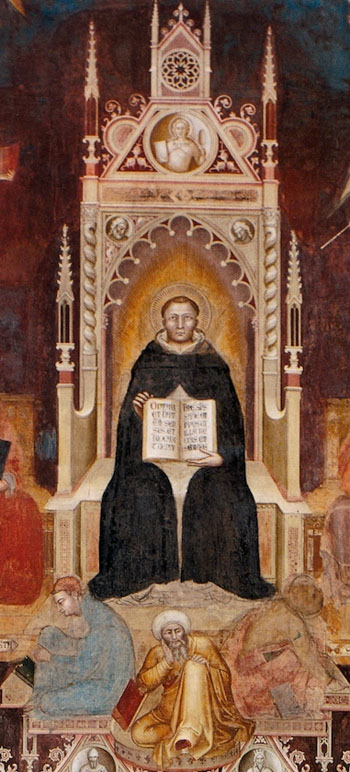 “Eccl. 17:12 says that God ‘imposed duties toward his neighbor on each one.’ Now, a Prelate is our neighbor. Therefore, we must correct him when he sins. ...
“Eccl. 17:12 says that God ‘imposed duties toward his neighbor on each one.’ Now, a Prelate is our neighbor. Therefore, we must correct him when he sins. ...
“Some say that fraternal correction does not extend to Prelates either because a man should not raise his voice against heaven, or because the Prelates are easily scandalized if corrected by their subjects.
“However, this does not happen, since when they sin Prelates do not represent heaven and, therefore, must be corrected. And those who correct them charitably do not raise their voices against them, but in their favor, since the admonishment is for their own sake. ... For this reason … the precept of fraternal correction extends also to the Prelates, so that they may be corrected by their subjects.” (1)
If an inferior – be he a priest or a layman – can correct a Prelate, a layman can likewise correct a priest.
In another passage St. Thomas straightforwardly upholds the principle that the faithful can question and admonish Prelates:
“There being an imminent danger for the Faith, Prelates must be questioned, even publicly, by their subjects. Thus, St. Paul, who was a subject of St. Peter, questioned him publicly on account of an imminent danger of scandal in a matter of Faith. And, as the Gloss of St. Augustine states (Ad Galatas 2:14), ‘St. Peter himself gave the example to those who govern so that if they should stray from the right path, they will not reject a correction as unworthy even if it comes from their subjects.’” (2)
Referring to the same episode, in which St. Paul reprehended St. Peter, St. Thomas teaches:
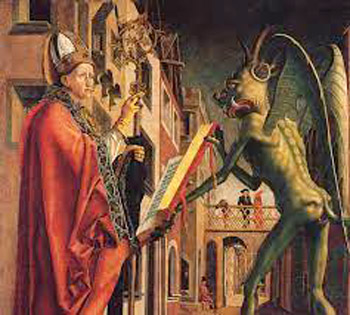 “The reprehension was just and useful, and the reason for it was not trivial: There was a danger for the preservation of evangelical truth ... The way it took place was appropriate, since it was public and open. For this reason, St. Paul writes: ‘I spoke to Cephas,’ that is, Peter, ‘before everyone,’ since the simulation practiced by St. Peter was fraught with danger to everyone.” (3)
“The reprehension was just and useful, and the reason for it was not trivial: There was a danger for the preservation of evangelical truth ... The way it took place was appropriate, since it was public and open. For this reason, St. Paul writes: ‘I spoke to Cephas,’ that is, Peter, ‘before everyone,’ since the simulation practiced by St. Peter was fraught with danger to everyone.” (3)
The Universal Doctor of the Church also shows how this case contains teachings not only for Hierarchs, but for the faithful as well:
“To the Prelates an example of humility was given so that they do not refuse to accept corrections from their inferiors and subjects; and to the subjects, an example of zeal and liberty so that they will not fear to correct their Prelates, above all when the crime is public and entails a danger for many.” (4)
With this doctrine of St. Thomas, it becomes crystal clear that a layman can and must admonish a priest, a bishop or even a pope in the case he runs the risk of going astray from the right path.
2. Other great theologians
I could quote texts of St. Augustine, St. Robert Bellarmine, Fr. Francisco de Vitoria, OP, and Fr. Francisco Suarez, SJ, teaching the same doctrine. The reader can find more demonstrations in this article, 'The Duty to Resist' by Atila S. Guimarães, from which I drew the texts of St. Thomas.
IV - Canon Law
But there is more.
For those who pretend that a layman should never speak out against a clergyman, they should know that even the 1983 Code of Canon Law does not agree with them. It clearly approves such action as "an obligation and right of all the Christian faithful," always made, of course, in a respectful way. Canon 212 § 3 states:
"According to the knowledge, competence, and prestige which they possess, they (laymen) have the right and even at times the duty to manifest to the sacred pastors their opinion on matters which pertain to the good of the Church and to make their opinion known to the rest of the Christian faithful, without prejudice to the integrity of faith and morals, with reverence toward their pastors, and attentive to the common advantage and the dignity of persons."
The Church does not legalistically forbid a Catholic journalist, or any qualified layman, from offering criticism of an ecclesiastical authority.
Third conclusion
I conclude the study of the Catholic Doctrine and Canon Law affirming that, without any shadow of doubt, laymen can criticize their superiors when the latter abandon or seem to abandon the path of orthodoxy.
Duties as a member of the Church Militant
The Church Militant – comprised of both Hierarchy and faithful – exists on this earth to fight. The Church is divided into three parts, the Church Triumphant (the saints in Heaven), the Church Suffering (the souls in Purgatory) and the Church Militant (those still living on earth).
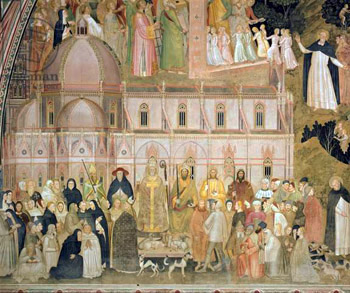 Holy Mother Church could have called this last group the Church Praying, for certainly we must pray to reach Heaven, but she did not. She called us the Church Militant, because the normal position of her members is always characterized by the combat.
Holy Mother Church could have called this last group the Church Praying, for certainly we must pray to reach Heaven, but she did not. She called us the Church Militant, because the normal position of her members is always characterized by the combat.
Outside her walls, the Holy Church has her foes – the heretics, schismatics, pagans and Jews – whom must be combated. This combat did not end with Vatican II. It continues and will never end until the end of the world.
Inside the Church, every Catholic has a twofold duty to fight. First, he must fight his own defects, the world and the Devil. Second, he must also fight those enemies who have infiltrated her walls with errors, compromises and heresies.
We take up these internal battles because it is our duty as members of the Church Militant.
Our life as Catholics is a fight, and we should not allow this important truth to be obliterated by anyone – lay or ecclesiastic – when the integrity of the Faith and her Tradition is threatened.
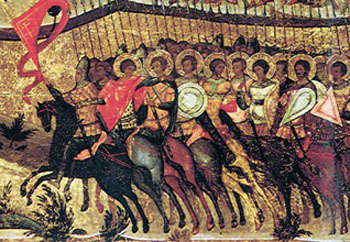


Msgr. DeLassus: 'It is not enough to pray, we must also fight'
And he lambasts those clergy who "want to stifle the polemic that until now has preserved the Faith of all corruption in order to replace it with a pacifism that would only maintain peace – and what a peace! A peace won at the expense of the inalienable rights of truth!" (Chap. 15, 'Que Faire?' - 'What to Do?')
This sound counsel of Msgr. Delassus, who was highly praised and honored by Pope St. Pius X, sounds quite different from the "infallible dogma" coming from many of today's traditionalist priests: that laymen cannot raise their voices publicly against Prelates and can never criticize a priest. Nor should they dare to try to defend the Church, a task that should be left to the Holy Ghost. And if they do so, they are arrogant; they are false prophets.
I have already demonstrated that this "dogma" has base neither in History nor Natural Law.
Now, I will address the sound Theological Doctrine of the Catholic Church.
III - Theological Doctrine
It is refreshing to see how the Church always has an answer to complicated questions and a solution for challenging problems.
1. St. Thomas Aquinas
For good reason St. Thomas received the title of Universal Doctor of the Church. He has something to say about whether or not an inferior can admonish a superior. In his Comments on the Sentences of Peter Lombard, generalizing on the episode of St. Paul admonishing St. Peter, he teaches that to correct a Prelate who sins is a work of mercy. In fact, the higher the Prelate’s position, the greater the merit of the one who corrects:

The Universal Doctor of the Church teaches a layman can correct a priest
“Some say that fraternal correction does not extend to Prelates either because a man should not raise his voice against heaven, or because the Prelates are easily scandalized if corrected by their subjects.
“However, this does not happen, since when they sin Prelates do not represent heaven and, therefore, must be corrected. And those who correct them charitably do not raise their voices against them, but in their favor, since the admonishment is for their own sake. ... For this reason … the precept of fraternal correction extends also to the Prelates, so that they may be corrected by their subjects.” (1)
If an inferior – be he a priest or a layman – can correct a Prelate, a layman can likewise correct a priest.
In another passage St. Thomas straightforwardly upholds the principle that the faithful can question and admonish Prelates:
“There being an imminent danger for the Faith, Prelates must be questioned, even publicly, by their subjects. Thus, St. Paul, who was a subject of St. Peter, questioned him publicly on account of an imminent danger of scandal in a matter of Faith. And, as the Gloss of St. Augustine states (Ad Galatas 2:14), ‘St. Peter himself gave the example to those who govern so that if they should stray from the right path, they will not reject a correction as unworthy even if it comes from their subjects.’” (2)
Referring to the same episode, in which St. Paul reprehended St. Peter, St. Thomas teaches:

When a Prelate teaches error,
the laity must reprimand him
The Universal Doctor of the Church also shows how this case contains teachings not only for Hierarchs, but for the faithful as well:
“To the Prelates an example of humility was given so that they do not refuse to accept corrections from their inferiors and subjects; and to the subjects, an example of zeal and liberty so that they will not fear to correct their Prelates, above all when the crime is public and entails a danger for many.” (4)
With this doctrine of St. Thomas, it becomes crystal clear that a layman can and must admonish a priest, a bishop or even a pope in the case he runs the risk of going astray from the right path.
2. Other great theologians
I could quote texts of St. Augustine, St. Robert Bellarmine, Fr. Francisco de Vitoria, OP, and Fr. Francisco Suarez, SJ, teaching the same doctrine. The reader can find more demonstrations in this article, 'The Duty to Resist' by Atila S. Guimarães, from which I drew the texts of St. Thomas.
IV - Canon Law
But there is more.
For those who pretend that a layman should never speak out against a clergyman, they should know that even the 1983 Code of Canon Law does not agree with them. It clearly approves such action as "an obligation and right of all the Christian faithful," always made, of course, in a respectful way. Canon 212 § 3 states:
"According to the knowledge, competence, and prestige which they possess, they (laymen) have the right and even at times the duty to manifest to the sacred pastors their opinion on matters which pertain to the good of the Church and to make their opinion known to the rest of the Christian faithful, without prejudice to the integrity of faith and morals, with reverence toward their pastors, and attentive to the common advantage and the dignity of persons."
The Church does not legalistically forbid a Catholic journalist, or any qualified layman, from offering criticism of an ecclesiastical authority.
Third conclusion
I conclude the study of the Catholic Doctrine and Canon Law affirming that, without any shadow of doubt, laymen can criticize their superiors when the latter abandon or seem to abandon the path of orthodoxy.
Duties as a member of the Church Militant
The Church Militant – comprised of both Hierarchy and faithful – exists on this earth to fight. The Church is divided into three parts, the Church Triumphant (the saints in Heaven), the Church Suffering (the souls in Purgatory) and the Church Militant (those still living on earth).

The Church Militant - clergy and laymen - must fight on this earth to enter the Church Triumphant
Outside her walls, the Holy Church has her foes – the heretics, schismatics, pagans and Jews – whom must be combated. This combat did not end with Vatican II. It continues and will never end until the end of the world.
Inside the Church, every Catholic has a twofold duty to fight. First, he must fight his own defects, the world and the Devil. Second, he must also fight those enemies who have infiltrated her walls with errors, compromises and heresies.
We take up these internal battles because it is our duty as members of the Church Militant.
Our life as Catholics is a fight, and we should not allow this important truth to be obliterated by anyone – lay or ecclesiastic – when the integrity of the Faith and her Tradition is threatened.

The mark of the Catholic is to fight & to love the fight
- IV Sententiarum, d. 19, q.2, a.2., in We Resist You to the Face, (Los Angeles: TIA, 2000), pp. 154-155.
- Summa theologiae (Turin/Rome: Marietti), 1948, II.II, q.33, a.4., in ibid., p. 154.
- Super Epistulas S. Pauli, Ad Galatas, 2, 11-14, (Taurini/Rome: Marietti, 1953), lec. III, nn. 83-84, in ibid.
- Ibid., n. 77., in ibid.

Posted on September 1, 2021














